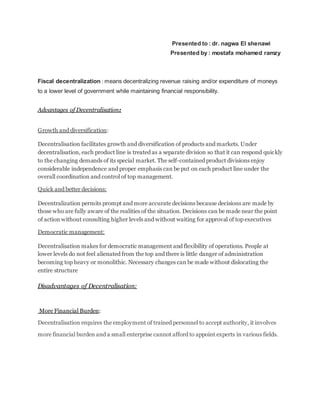Eco
- 1. Presented to : dr. nagwa El shenawi Presented by : mostafa mohamed ramzy Fiscal decentralization : means decentralizing revenue raising and/or expenditure of moneys to a lower level of government while maintaining financial responsibility. Advantages of Decentralisation: Growth and diversification: Decentralisation facilitates growth and diversification of products and markets. Under decentralisation, each product line is treated as a separate division so that it can respond quickly to the changing demands of its special market. The self-contained product divisions enjoy considerable independence and proper emphasis can be put on each product line under the overall coordination and control of top management. Quick and better decisions: Decentralization permits prompt and more accurate decisions because decisions are made by those who are fully aware of the realities of the situation. Decisions can be made near the point of action without consulting higher levels and without waiting for approval of top executives Democratic management: Decentralisation makes for democratic management and flexibility of operations. People at lower levels do not feel alienated from the top and there is little danger of administration becoming top heavy or monolithic. Necessary changes can be made without dislocating the entire structure Disadvantages of Decentralisation: More Financial Burden: Decentralisation requires the employment of trained personnel to accept authority, it involves more financial burden and a small enterprise cannot afford to appoint experts in various fields.
- 2. Conflict: Decentralisation puts more pressure on divisional heads to realize profits at any cost. Often in meeting their new profit plans, bring conflicts among managers Centralization a process where the concentration of decision making is in a few hands. All the important decision and actions at the lower level, all subjects and actions at the lower level are subject to the approval of top management Advantages and Disadvantages the state takes upon itself the task of planning the whole economic life, the problem of the due station of the different individuals and groups must indeed inevitably become the central political problem. As the coercive power of the state will alone decide who is to have what, the only power worth having will be a share in the exercise of this directing power. There will be no economic or social questions that would not be political questions in the sense that their solution will depend exclusively on who wield the coercive power, on whose are the views that will prevail on all occasions…. the "advantage" there is no any local decisions. Which lead to the stabiblty of the state and the avoidance of contradictory decisions between the twe level of government the best for egypt china is an example of applying the financial decentralization and if egypt which is a highly centralized country adopt an decentralized administrative system it will facilitates the growth of the economy and democratic management and flexibility of operations and Decentralization permits prompt and more accurate decisions


